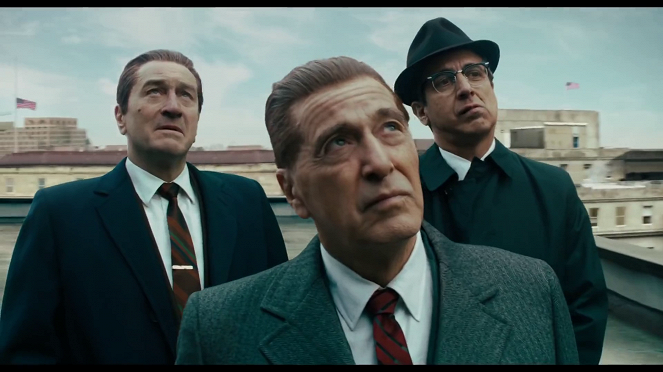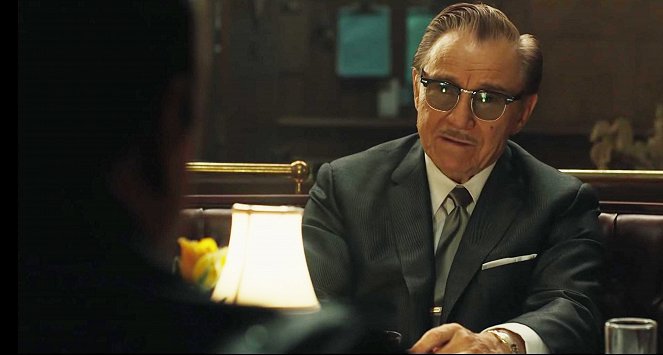Directed by:
Martin ScorseseScreenplay:
Steven ZaillianCinematography:
Rodrigo PrietoComposer:
Robbie RobertsonCast:
Robert De Niro, Al Pacino, Joe Pesci, Bobby Cannavale, Harvey Keitel, Ray Romano, Stephen Graham, Anna Paquin, Stephanie Kurtzuba, Jack Huston (more)VOD (1)
Plots(1)
Martin Scorsese’s cinematic mastery is on full display in this sweeping crime saga, which serves as an elegiac summation of his six-decade career. Left behind by the world, former hit man and union truck driver Frank Sheeran (Robert De Niro) looks back from a nursing home on his life’s journey through the ranks of organized crime: from his involvement with Philadelphia mob boss Russell Bufalino (Joe Pesci) to his association with Teamsters union head Jimmy Hoffa (Al Pacino) to the rift that forced him to choose between the two. An intimate story of loyalty and betrayal writ large across the epic canvas of mid-twentieth-century American history, The Irishman (based on the real-life Sheeran’s confessions, as told to writer Charles Brandt for the book I Heard You Paint Houses) is a uniquely reflective late-career triumph that balances its director’s virtuoso set pieces with a profoundly personal rumination on aging, mortality, and the decisions and regrets that shape a life. (Criterion)
(more)Videos (7)
Reviews (16)
An unbelievably complex guide to the life of a person who has outlived everybody and is settling accounts of his life as the end draws near. The crème of the acting profession came together to film the long-postponed project I Heard You Paint Houses, led by the director eminently best suited to the task. Pacino gives a masterful performance as union boss Jimmy Hoffa, but Pesci’s return is a blessing for the entire film. The nuances, the faint hints, the one-liners delivered with zest… This is going to score a lot of Oscars. The digital effects are not perfect, but only seem to do harm to De Niro’s performance. But after a while you stop noticing. It’s such a good story. Definitely the film of the year. I chose us over him.
()
While I was watching it, I felt like I had aged about 10 years. The Irishman really made a perfect gerontocratic impression on me. Normally, American films are tailored to the audience that is willing to come to the movie theater, i.e., the younger generation, while this one targets more so the older folks who have seen Scorsese's mafia classics. Although I like the entire cast, which I hope Scorsese gathered for the last time, I feel like this memorial was no longer necessary. The film is long-winded, artificial, and lacking in refinement. Aside from the unnatural de-aging, which only works partly because the walking and gestures give away a lot, there is nothing explicitly wrong with this film, but at the same time, there is nothing that you haven't already seen in Scorsese's work in a much better form. The positive reviews of the film, at least partially in my opinion, stem from the phenomenon of the "Lifetime Achievement Oscar." I watched the film without enthusiasm and had to abandon it tiredly after 30 minutes the first time. But giving it only two stars would be too little, Scorsese is too good of a filmmaker for that. And even with its insane duration, there are interesting cinematic moments here and there. Overall impression: 50%.
()
As much as I love gangster movies, I'm not too happy with Irishman. Martin Scorsese returns to the genre that made him famous and assembles together a cast of mafia legends, but he fails to draw me into the plot at all. I enjoyed the first hour, where Robert De Niro gets into the gangster underworld as an assassin, but once Al Pacino showed up, the film stopped being all that interesting. I was disappointed that there were no shootouts and even the few murders looked pretty unnatural. I wasn't too interested in the plot, the dialogue had nothing to engage me, it's not suspenseful or tense either, so I really don't know where to look for plus points. I'd rather watch Scarface again, but at least I didn't suffer like I did with the new Tarantino film. 6/10.
()
Once upon a time in the unions. Just as Sergio Leone has his dollar trilogy, Martin Scorsese now has his mafia trilogy, and I finally got to see its culmination at a time when I simply wasn't expecting it anymore. The youngest brother of The Godfather and Goodfellas arrived just when the deserving creator is close to eighty and boldly shows skeptics that age is just a number. Frank Sheeran's story is more nostalgic than the two aforementioned pieces, it doesn't need as much help in the format and imagery of the individual events, it simply sails, recounts, and reminisces for about three and a half hours, recalling things that are not easy to remember. He introduces a hundred and one supporting characters with removal, only to effortlessly run chills down our spines during a title pause with their fate. And in the midst of it all, the royal trio of Robert De Niro, Joe Pesci, and most of all Al Pacino remains, in incredible acting performances as legends at the twilight of their careers (for Pesci, even after its actual end), savor the most passionate of arguments and subtlest of nuances. I knew this journey would be about murder, the mafia, politics, and courtroom drama, but I didn't expect it to be so precisely about aging and the transience of each life, when the most important things are precisely those that have irreversibly disappeared.
()
When, after roughly two hours, The Irishman stops switching between the two narrative lines and three different time planes that together set the film’s rhythm, it becomes clear that the wedding was not actually the primary destination of Frank’s journey. At the same time, one important character from Frank’s past comes into the road-movie framework. Contrary to the custom of accelerating the pace as the end approaches, the film slows down and becomes more focused, no longer engaging in a series of diversions and jumping between numerous people and events. We realise that the memory of a given event is of fundamental importance for Frank and he wants to recount it in as much detail as possible, step by step, minute by minute. Thanks to the context provided by the previous two hours, we concurrently comprehend what this is leading to and what the individual characters are experiencing. We start to understand that Frank had merely been carrying out another one of his missions, which usually ends with a house getting painted. ___ In the first narrative line, Frank is in the final phase of his life, just before his death. In the other, he is heading toward death. It seems that all of the events in his life involve death and dying in some way. The detached approach to killing well demonstrates Scorsese’s departure from the more dynamic style of his earlier mafia films. In The Irishman, violence is not “cool”; sometimes we don’t even see it, we only hear it from a distance. If an upbeat song is playing in the car during one of the murders, that is only because the driver turned on the radio to drown out the death rattle of the strangled victim. ___ Frank's blackened conscience, a reminder of his sins and the incompatibility of violent behaviour with the feeling of having a safe home, is represented by his daughter Peggy, thanks to whom we realise that Frank fills his emotional emptiness with words and diverts attention from his inner self to the outside. Though Frank’s relationship with his daughter may seem to be of secondary importance in the context of a story in which people die, cars explode and mobsters bribe top politicians, it is that relationship which best describes how Frank feels and what he longs for above all else: to go out into the world reconciled with himself and with his loved ones. Despite first appearances, the core of the film thus does not represent Frank’s involvement in the structures of the Italian-American mafia and trade unions, but what he lost due to his career advancement. Civil dialogue and time spent in the family circle appear to be more important than a detailed description of the underworld and a factual depiction of Frank’s work processes. Rather than an epic mafia saga, The Irishman is primarily an intimate drama about dysfunctional relationships and the constant presence of death, the basis of which we always carry within ourselves (as we realise thanks also to digitally rejuvenated acting veterans). 95%
()



Ads